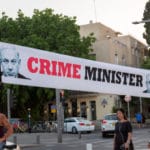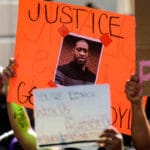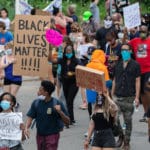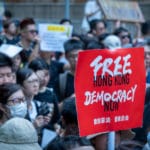Mass Protests in Hong Kong
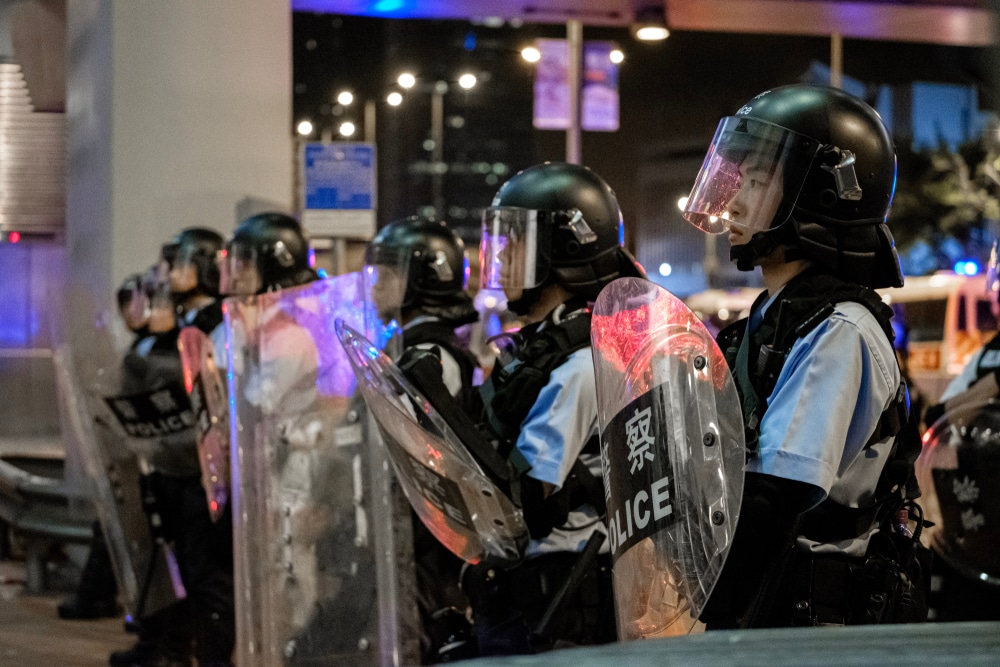
Jack_Wong / Shutterstock.com
Hong Kong has experienced yet another day of violent clashes between police and pro-democracy demonstrators who are extremely angry at alleged brutal acts of the police. According to reports Police used tear gas and rubber bullets to scatter the protesters who were trying to reach the Chinese government’s office for protests and demonstrations. Countless demonstrators have taken over streets near Sai Wan and Causeway Bay on Hong Kong Island against the government. The city has seen eight consecutive weekends of anti-government and pro-democracy protest.
Though Hong Kong is ranked as one of the safest cities in the world, recent protests have been followed by violent clashes between demonstrators, police and masked men wielding sticks suspected of being criminal gang members who took the advantage of the whole scenario.
Primarily the reason behind all the above protest is the proposing of Extradition Bill. Demonstrations began when the Hong Kong government introduced the above controversial bill that would have enabled extraditions to mainland China. It ignited mass protests as critics feared that the bill would weaken Hong Kong’s freedoms, and be used to target political activists.
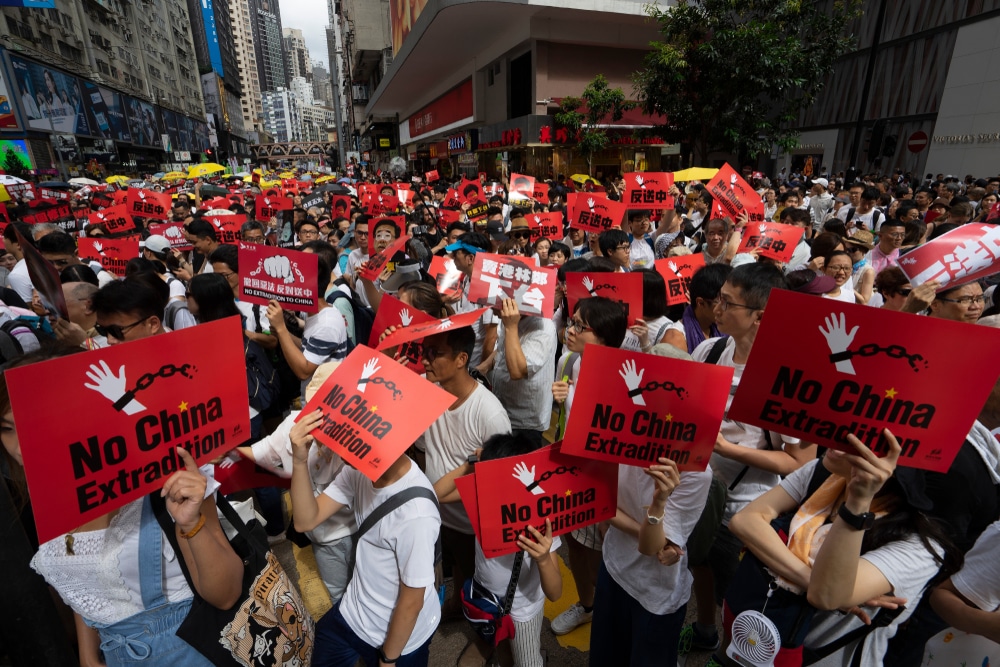 John YE / Shutterstock.com
John YE / Shutterstock.comReason Behind the protest: A detailed chronology
After several weeks of pro-democracy protests in Hong Kong, the unrest seems to be unstoppable and unsettling in any way. All the protests began over plans – later put on ice – that would have allowed extradition from Hong Kong to mainland China. But they’ve now spread to reflect wider demands for democratic reform.
This is not something which is kept in secret indeed the whole scenario is public. There’s a lot of important contexts to know about the whole story and some of it even stretches back to decades that would help explain what is going on.
Hong Kong is pretty much different from the rest of the Chinese cities as it was a British colony for more than 150 years. A part of it, Hong Kong Island, was relinquished to the UK after a war in 1842. Subsequently, China also leased the rest of Hong Kong – the New Territories – to the British for 99 years.
Then, as the deadline for the 99-year-lease approached, in the early 1980s, Britain and China began talks on the fate of Hong Kong – with the communist government of China being of the opinion that the territory should be reverted back to China. Subsequently, two sides reached a deal in 1984 that would see Hong Kong return to China in 1997, under the principle of “one country, two systems”. This meant that after becoming part of one country with China, Hong Kong would enjoy “a high degree of autonomy, except in foreign and defense affairs” for 50 years. As a result, Hong Kong has its own legal system and borders, and rights including freedom of assembly and free speech are protected.
But things are not the same since rights groups have accused China of interfering in Hong Kong, providing examples such as legal rulings that have debarred pro-democracy legislators. They’ve also been concerned by the disappearance of five Hong Kong booksellers, and a tycoon – all eventually re-emerged in custody in China.
Artists and writers have been accusing that they were under substantial pressure to self-censor – and a Financial Times journalist was even barred from entering Hong Kong after he hosted an event that featured an independence activist.
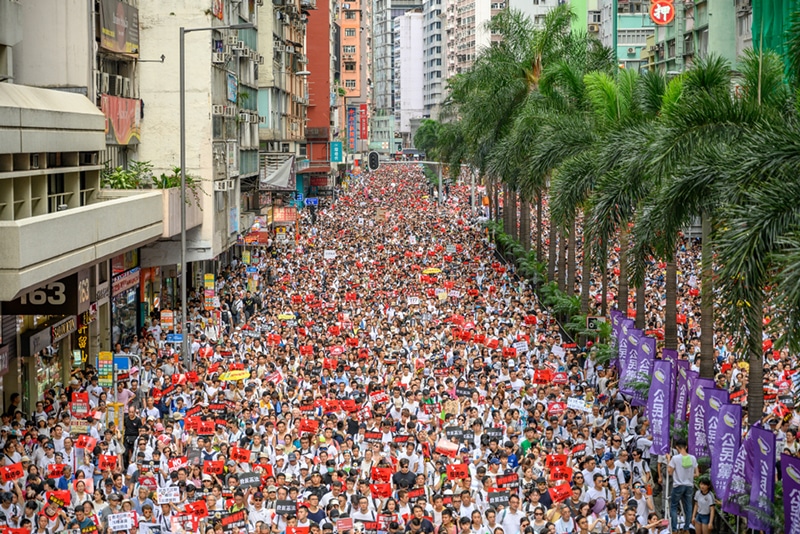 PaulWong / Shutterstock.com
PaulWong / Shutterstock.comHere is the chronological order of the events that lead to the above demonstrations in Hong Kong:
On April 03, 2019 the Government of Hong Kong proposed amendments to the city’s extradition laws to the legislature that would allow criminal suspects to be extradited to mainland China.
On June 09, 2019 the first of many huge protests against the proposed law begun when an estimated million people marched to government headquarters.
On June 12, 2019, the people against the extradition bill blocked the roads and tried to storm government buildings – police fired tear gas, rubber bullets and bean bag rounds at protesters to scatter them, which could be the worst violence the city has witnessed in decades.
On June 15, 2019, Hong Kong leader Carrie Lam delayed the bill in a dramatic reversal. Followed by 16 June on which an estimated two million people take to the streets demanding the complete withdrawal of the extradition bill, with an investigation to look into the matter of alleged police violence accompanied by Carrie Lam’s resignation.
On June 21st, 2019 as the anger grows towards police, protests blockade police headquarters for 15 hours. Ultimately 1 July the day which marked the anniversary of Hong Kong’s handover from the UK to China, the Legislative Council (LegCo) building was stormed and broken into by protesters against the extradition.
On July 21st, 2019 Protesters deface China’s Liaison Office in Hong Kong. That same night some men wearing white shirts attack protesters and commuters in Yuen Long station, near mainland China, escalating the already spread violence.
The above chronology explains effectively how the whole scenario relating to the extradition bill got ignited and escalated quickly.
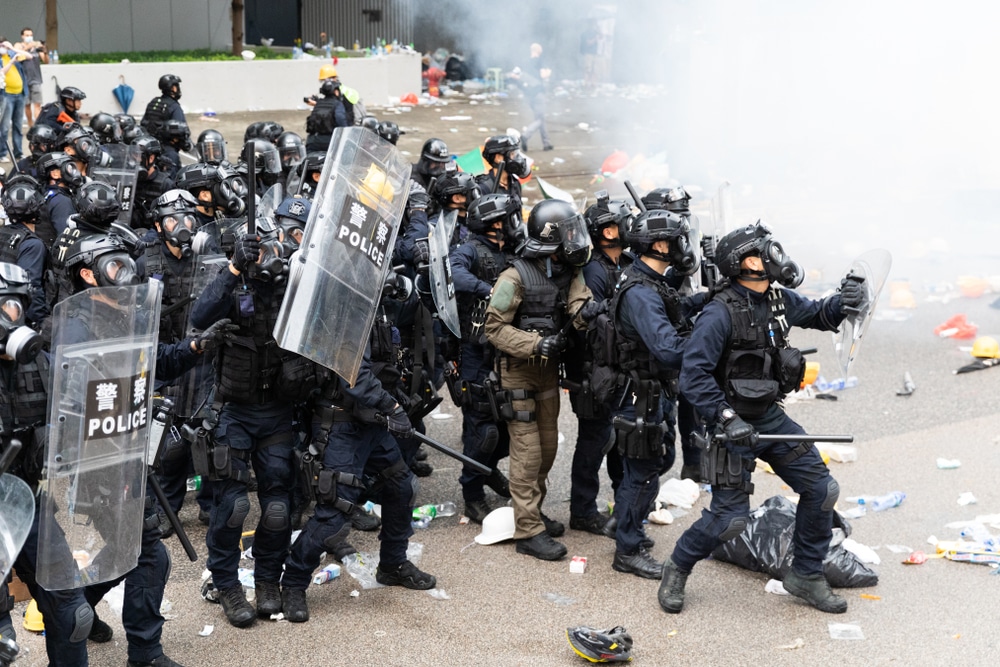 Dave Coulson Photography / Shutterstock.com
Dave Coulson Photography / Shutterstock.comLocal Authorities
Though it is the legal right of the demonstrators to protest and record their opinion regarding a matte. But, Due to the mass agitation in recent time, the government is pretty much angry and unsatisfied with the locals who took part in the agitation. Moreover, Martin Lee, the founding chairman of Hong Kong’s Democratic Party, said that while he could not defend the protesters’ violent actions on Monday, he could understand their frustrations.
Hong Kong leader Carrie Lam condemned the “extremely violent” storming of the city’s parliament to a great extent after hundreds of protesters ransacked the assembly in an unprecedented display of defiance. During a press conference in the early hours, Lam called the events “heartbreaking and shocking” and said she hoped society would “return to normal as soon as possible”. She acknowledged that thousands of people marched peacefully in the city before the unrest.
Reaction of China
The reaction of china could be interpreted easily when the spokesman for Hong Kong and Macau Affairs Office referred the protestors an evil and criminal element of the society. Additionally, the government also believe that Hong Kong’s top priority is to punish violent and unlawful acts in accordance with the law, is in alignment with the interests of China as well, and to restore social order as soon as possible, and to maintain a good business environment.
It was also seen that the Chinese Government:
- Was “strongly” in support of the leadership in Hong Kong and potential steps taken by them.
- Called on the people of Hong Kong to “unequivocally oppose and resist violence”.
- Expressed support for the city’s police force
- Blamed the escalating tensions on “irresponsible figures in Western countries” who are hoping to “contain China’s development”
International community
The rest of the world also showed concern towards this burning topic. The United States called on all sides in Hong Kong to show restraint, to take a diplomatic position between the state and the protestors.
The US through its spokesmen has been seen saying that We urge all sides to refrain from violence, and so that the problem is elevated effectively. The spokesman further added, “Hong Kong’s success is predicated on its rule of law and respect for fundamental freedoms, including freedoms of expression and peaceful assembly.”
The US has voiced solidarity with activists who succeeded in blocking, for now, a move by Hong Kong’s pro-Beijing authorities to allow extraditions to the Chinese mainland, whose communist system is notorious for meting out harsh justice.
Predictions
Although the Government of Hong Kong has the support of the majority of the world in the favor of what they are doing it should also be considered that the protestors are also highly concentrated and focused on the goal of reversal of the bill. The mass protests are creating an element of unrest and uncertainty and also is proving detrimental for the overall health of the economy of Hong Kong. If the situation does not come under control soon the government won’t hesitate in taking the support of military troops to clear out the whole scenario. Though China’s People’s Liberation Army (PLA) does have troops stationed in Hong Kong, they are not expected to interfere in local issues as of now.
However, the law does fully give the right to Hong Kong’s government to demand assistance from the PLA for purposes of maintaining public order, or disaster relief. The government of Hong Kong and police have stated in recent weeks that they have no plans to involve the army – while some may argue that China would consider using its troops in Hong Kong to be too politically risky.
Now it’s solely upon the government of Hong Kong, how effectively and efficiently they deal with the current scenario, considering the available options.
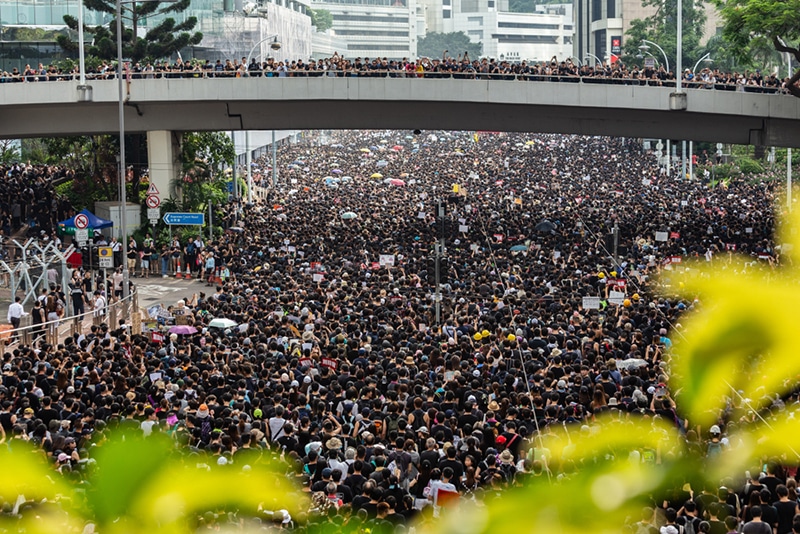 samuelwong / Shutterstock.com
samuelwong / Shutterstock.com


